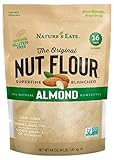Almond flour vs all purpose flour – which one is healthy? Almond flour and all-purpose flour are both common ingredients in baking and cooking, but they aren’t the same thing.
Flour is the main ingredient when you are baking. Whether you are making pastry, cookies, cakes, or other types of desserts, there are many types of flour to use to make the perfect dish.
There are many types of flour and people tend to use flour-based mostly in their diet. All-purpose flour is most frequently used, then white flour combined with many other ingredients to make a good pastry.
Flour is not just made from wheat, but it can also be made from ground varieties of nuts and seeds, like almond flour, which is very healthy.
But, you probably wonder what is the main difference between almond flour and all-purpose flour. Can they be a substitute for each other?
Can I use almond flour instead of all-purpose flour? Actually, no. Even though you can try, there is a difference in the structure and the way these flours are made.
Today I compare them in terms of healthiness and nutrition as well as highlight their best uses so you can make an informed decision about which one is right for your diet and lifestyle.
Page Contents
What is Almond Flour?
Almond flour is a gluten-free, grain-free alternative to all-purpose flour. It has a slightly sweet, nutty flavor and is lower in carbs than all-purpose flour. It’s also higher in protein and fiber. However, it’s more expensive than all-purpose flour.
Almond flour is made from blanched almonds that have been ground to a fine powder.
Blanching is done to remove their brown skin. This process can be done with either hot water or steam. To blanch almonds with hot water, simply place them in a bowl of boiling water for a few minutes.
To blanch them with steam, place them on a steaming rack over boiling water for about 10 minutes. After the almond has been peeled, they will need to dry before they can be ground into flour.
The best way to do this is by spreading them out on a sheet pan and placing it in the oven at 110 degrees Celsius for 30 minutes. I have also written an article on Siete Almond Flour Tortillas And How To Make Them.
What’s The All Purpose Flour?
All-purpose flour is a type of milled wheat flour that contains a mix of short- and long-chain gluten proteins. It’s milled from hard and soft wheat, making it higher in protein than other types of wheat flour.
All-purpose flour can be used to make a variety of baked goods, including bread, pastries, and cookies. While all-purpose flour is a versatile option, it’s not the healthiest choice.
| # | Preview | Product | Price | |
|---|---|---|---|---|
| 1 |  | Gold Medal All Purpose Flour, 5 lbs | $3.83 | Buy on Amazon |
| 2 |  | Gold Medal Unbleached All Purpose Flour, 10 pounds | $6.43 | Buy on Amazon |
| 3 |  | King Arthur Flour, Organic All Purpose Flour, 32 oz | $4.69 | Buy on Amazon |
Differences Between Almond Flour vs All Purpose Flour
All-purpose flour and almond flour have several key differences in the kitchen:
Gluten content: A key difference between AP flour and almond flour is the presence of gluten, a family of proteins found in wheat products. While AP flour is rich in gluten, almond flour doesn’t contain any at all. Thus, almond flour is a popular flour substitute for gluten-intolerant bakers who need to omit proteins from their diets for health reasons.
Fat content: AP flour is low in fat, so it doesn’t add much moisture to baked goods. Conversely, almond flour has a high-fat content, which adds extra moisture to recipes and may result in heavy, dense, or greasy-feeling baked goods.
Flavor: AP flour has a mild flavor that typically fades to the background in cake, bread, and cookie recipes, allowing other flavors to shine.
By contrast, almond flour has a stronger, nuttier flavor, which can become prominent if you’re not used to baking with the ingredient. If you’re new to the flour alternative, try a few almond-flour recipes before substituting it for AP flour in a favorite recipe.
Shelf life: During the milling process for AP flour, manufacturers separate two wheat kernel components—bran and germ—from the endosperm, removing oils that encourage spoilage and making it more shelf-stable than other flours. Therefore, AP flour can last six to eight months on the shelf or up to a year in the fridge.
On the other hand, almond flour tends to have a much shorter shelf life than regular flour—a few months on the shelf or up to six months in the fridge. You can get more from this video.
Can You Substitute Almond Flour vs All Purpose Flour?

In most recipes, you cannot substitute almond flour for all-purpose flour (or other wheat flour) in a simple cup-for-cup replacement because of its lack of gluten and high-fat content. Gluten is an essential binder in wheat-based baked goods, and low-fat flour is key to avoiding greasy or dense results.
If your recipe calls for all-purpose flour and you want to use a gluten-free substitute, try using a lower amount of almond flour—a ¾ cup for every 1 cup of all-purpose flour—and add a binding agent to act as a glue.
(Common gluten-free binders are xanthan gum, guar gum, and psyllium husk). You may need to experiment with ratios several times before you get the perfect combination. You can also read more about The Best Dry Roasted Edamame Information.
Nutrition Facts
| All Purpose Flour | Almond Flour |
| Calories: 455 | Calories: 610 |
| Fat: 1.2g | Fat: 54g |
| Carbohydrates: 95.4g | Carbohydrates: 4.3g |
| Fiber: 3.4g | Fiber: 11g |
| Protein: 12.9g | Protein: 19g |
Conclusion
Almond flour and all-purpose flour are two of the most popular ingredients in baking and cooking, so it’s natural to wonder how they compare and whether one is healthier than the other.
So in case, you’re still wondering which one is best, almond flour is a go-to.
Indeed, it tends to be a trade for treats, cakes, bread, or hotcakes. Be that as it may, there is no standard change on the off chance that you are involving them as substitutes.
This kind of flour is exceptionally nutritious and is great for your glucose. Almond flour contains low carbs and solid fats and fiber.
Indeed, the normal utilization of white flour can prompt greasy liver and it will bring the cholesterol up in your blood framework. This might cause hypertension, weight gain, and emotional episodes. So make an effort not to eat that numerous baked goods that contain regular flour.





